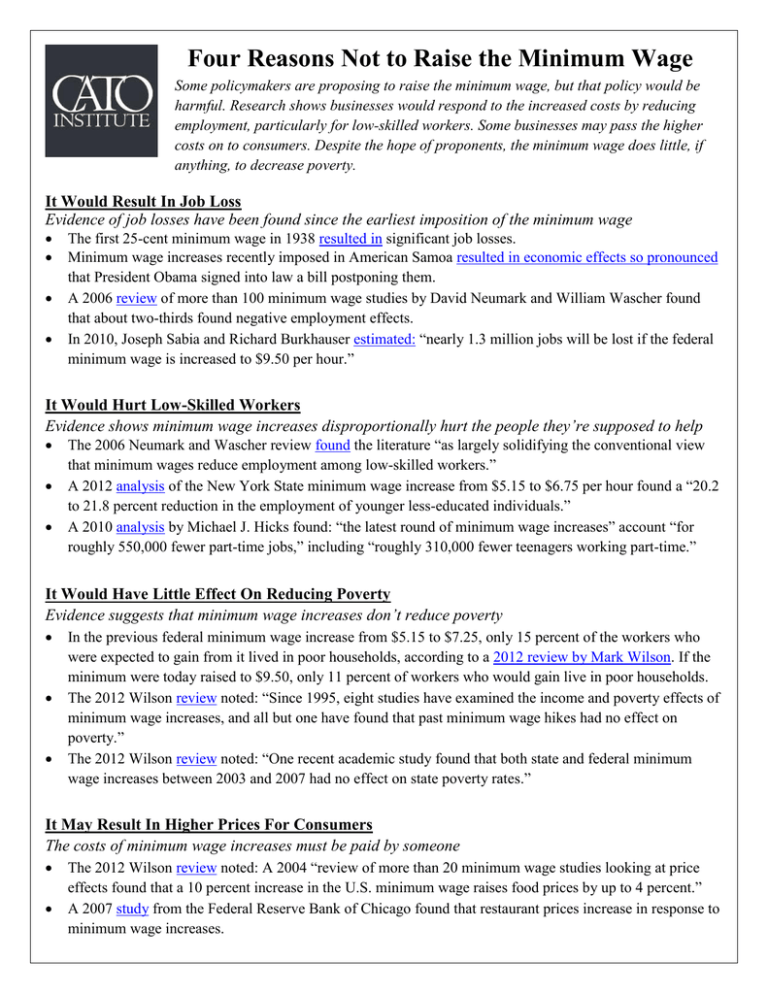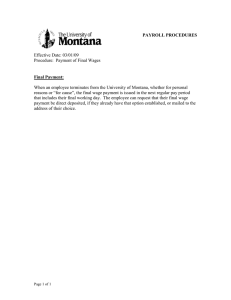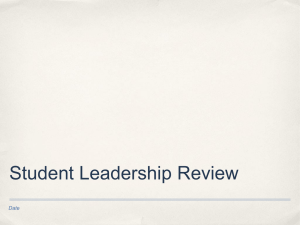Four Reasons Not to Raise the Minimum Wage
advertisement

Four Reasons Not to Raise the Minimum Wage Some policymakers are proposing to raise the minimum wage, but that policy would be harmful. Research shows businesses would respond to the increased costs by reducing employment, particularly for low-skilled workers. Some businesses may pass the higher costs on to consumers. Despite the hope of proponents, the minimum wage does little, if anything, to decrease poverty. It Would Result In Job Loss Evidence of job losses have been found since the earliest imposition of the minimum wage The first 25-cent minimum wage in 1938 resulted in significant job losses. Minimum wage increases recently imposed in American Samoa resulted in economic effects so pronounced that President Obama signed into law a bill postponing them. A 2006 review of more than 100 minimum wage studies by David Neumark and William Wascher found that about two-thirds found negative employment effects. In 2010, Joseph Sabia and Richard Burkhauser estimated: “nearly 1.3 million jobs will be lost if the federal minimum wage is increased to $9.50 per hour.” It Would Hurt Low-Skilled Workers Evidence shows minimum wage increases disproportionally hurt the people they’re supposed to help The 2006 Neumark and Wascher review found the literature “as largely solidifying the conventional view that minimum wages reduce employment among low-skilled workers.” A 2012 analysis of the New York State minimum wage increase from $5.15 to $6.75 per hour found a “20.2 to 21.8 percent reduction in the employment of younger less-educated individuals.” A 2010 analysis by Michael J. Hicks found: “the latest round of minimum wage increases” account “for roughly 550,000 fewer part-time jobs,” including “roughly 310,000 fewer teenagers working part-time.” It Would Have Little Effect On Reducing Poverty Evidence suggests that minimum wage increases don’t reduce poverty In the previous federal minimum wage increase from $5.15 to $7.25, only 15 percent of the workers who were expected to gain from it lived in poor households, according to a 2012 review by Mark Wilson. If the minimum were today raised to $9.50, only 11 percent of workers who would gain live in poor households. The 2012 Wilson review noted: “Since 1995, eight studies have examined the income and poverty effects of minimum wage increases, and all but one have found that past minimum wage hikes had no effect on poverty.” The 2012 Wilson review noted: “One recent academic study found that both state and federal minimum wage increases between 2003 and 2007 had no effect on state poverty rates.” It May Result In Higher Prices For Consumers The costs of minimum wage increases must be paid by someone The 2012 Wilson review noted: A 2004 “review of more than 20 minimum wage studies looking at price effects found that a 10 percent increase in the U.S. minimum wage raises food prices by up to 4 percent.” A 2007 study from the Federal Reserve Bank of Chicago found that restaurant prices increase in response to minimum wage increases.

